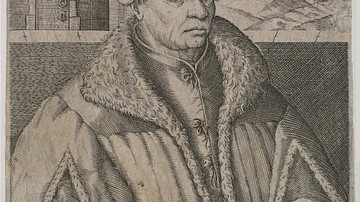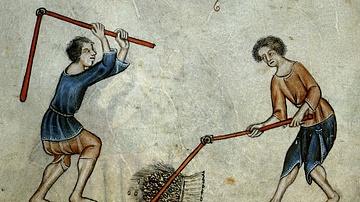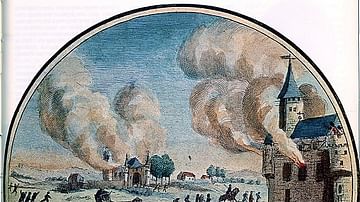Search
Summary 
Loading AI-generated summary based on World History Encyclopedia articles ...
Search Results

Definition
German Peasants' War
The German Peasants' War (1524-1525) was a conflict between the lower class of the Germanic region of the Holy Roman Empire and the nobility over the feudal system of serfdom, religious freedom, and economic disparity. It was later characterized...

Definition
Peasants' Revolt
The Peasants' Revolt, also known as the Great Revolt, was a largely unsuccessful popular uprising in England in June 1381. The rebellion's leaders included Wat Tyler and they wanted massive social changes which included a removal of the poll...

Definition
Twelve Articles
The Twelve Articles (1525) is a document written between 27 February and 1 March 1525 addressing grievances of the peasants of the Germanic regions of the Holy Roman Empire against the policies of their lords. The work was written to explain...

Definition
Thomas Müntzer
Thomas Müntzer (l. c. 1489-1525) was a German theologian and apocalyptic preacher who became one of the leaders of the German Peasants' War (1524-1525). An early follower of the reformer Martin Luther (l. 1483-1546), Müntzer established his...

Video
Peasants Revolt | 3 Minute History
https://www.patreon.com/Jabzy Thanks to Xios, Alan Haskayne, Lachlan Lindenmayer, Victor Yau, William Crabb, Derpvic, Seth Reeves and all my other Patrons. If you want to help out - https://www.patreon.com/Jabzy?ty=h https://twitter.com/JabzyJoe...

Image
Egyptian Model of Peasants Ploughing
Model of peasants ploughing from Egypt. 11th or 12th Dynasty, c. 2025-1850 BCE.
The British Museum, London.

Image
Medieval Peasants Threshing
A 14th century CE manuscript illustration showing peasants threshing wheat. (Luttrell Psalter, British Library, London)

Image
Richard II & the Peasants' Revolt
A 15th century CE medieval manuscript illustration showing Richard II of England (r. 1377-1399 CE) meeting the rebels of the 1381 CE Peasants' Revolt in London. (National Library of France, Paris)

Image
Episode from the German Peasants' War
Episode from the German Peasants' War, oil on canvas painting by Hermann Eichler, c. 1867.
Belvedere, Vienna.

Definition
Great Fear
The Great Fear (French: la Grande Peur) was a wave of panic that swept the French countryside in late July and early August 1789. Fearful of plots by aristocrats to undermine the budding French Revolution (1789-1799), peasants and townspeople...